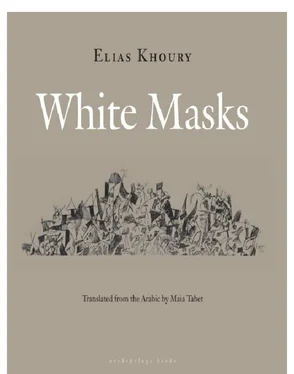Poor Khalil Jaber! I swear I didn’t know he’d end up being murdered. I’m sure he meant no harm, either to me or to Aida. I just happened to tell Comrade Ayyash about it. . I ran into him on the street one day and told him. I was trying to be funny, but Ayyash took it seriously and said he’d let the officer in charge of our neighborhood know. He also asked me about the car. I told him it had never come back but that I’d begun to get used to living without it.
When I told my friend Musa Kanj that the man had disappeared, he seemed relieved and said we shouldn’t allow beggars like him to “deface our city.” I told him he wasn’t a beggar.
“Khalil Ahmad Jaber is no beggar,” I said. “I tried to give him money once and he refused. He’s just a man of strange ways.”
Musa, who wasn’t really interested in what I was saying, related that his wife had come back from abroad and that everything was going according to plan. And he thanked me for my good taste in refurbishing his new house.
“Excellent job, my friend. . Even nicer than what one finds in Europe…!”
Poor Khalil Jaber, I wonder who killed him? I can’t imagine that anyone had anything to gain by his murder. He was just a poor guy, looking like one of those beggars, he had nothing — and he wouldn’t hurt a fly!
It’s true we found him annoying, but these days one’s annoyed with one’s own self. Such dreadful times we live in. . all we hear about are crimes and stories of murder… Is there no end to this?
My wife says the only solution is praying and so I pray. But praying isn’t everything. There are other things, real problems I mean, and I don’t know the solution to those.
And the poor martyr, Khalil. . I swear he’s a martyr. . I feel ashamed of myself. . but I didn’t know that he was the Khalil Ahmad Jaber who would be murdered and whose picture would be in all the papers. I swear, had I known, I would’ve taken him in and cared for him. . What can we do? It was God’s will!
Fatimah Fakhro, 42, widow of Mahmud Fakhro, the deceased caretaker of the Peace Towers Building that sits at the end of Mar Elias Street, overlooking Mazra’a Avenue. After her husband’s death, Fatimah was able to stay on in the building thanks to numerous interventions on her behalf — in particular, the intercession of Professor Nabeel Assi, a member of the Arts Faculty at the Lebanese University, and one of the cadres of the National Movement in Beirut. The landlord, Mr. Basheer al-Harati, agreed that Fatimah could stay in the caretaker’s quarters and collect her husband’s salary — but only, it is alleged, after receiving threats moving him to understand that it was in his best interest “not to cause any trouble.” Fatimah gave him her word that her children would not be allowed to play in the lobby of the building because that “would just cause too much noise and disturb the tenants.”
Following the discovery of Khalil Ahmad Jaber’s body, Fatimah was repeatedly detained for questioning, and, while she eventually admitted to her relationship with the deceased, she denied any involvement in his murder. Given the lack of solid evidence against her, and also because of her genuinely cooperative attitude, the strongmen in charge of the local party office concluded she was innocent.
“Now what!. . If it’s not one thing, it’s another. . nothing but trouble, from the day we are born!”
Fatimah Fakhro doesn’t understand what is happening to her. . This man had nothing to do with her, nothing whatsoever… First her eldest, Ali, had fallen down outside and pierced his skull with a nail, then her old man’s grizzly death, and the hullabaloo over Professor Nabeel’s intercession on her behalf, and now this. . It was just one calamity after another! When she asks them why they’ve dragged her here, her question is met with scowls and a barrage of questions.
But how did they find out? She didn’t tell anyone, she didn’t even know anything about the man’s death until Sitt Elham, the landlord’s wife, told her the body had been found; then it turned out that their neighbor, the engineer Ali Kalakesh, also knew the dead man — he’d seen him around the neighborhood, she said.
That was the day she told her. Sitt Elham was standing in the doorway of the kitchen, puffing on a cigarette and gossiping, as Fatimah cooked. She told the lady that she too had seen him around the neighborhood, and that she had even spoken to him. Sitt Elham said that was a rash thing to have done.
“Yes, and I wept, even though I didn’t know him.”
The men in the party office glower at her. One is smoking; he exhales right into her face and says: “We know everything, every single thing that goes on around here. Nothing escapes us.”
So she confesses. She feels that since they know everything there’s no point in lying. She tells them how she’d noticed him sitting on the sidewalk and asked him what he was doing in their neighborhood; and how he had asked for a piece of bread, and she’d given it to him. She is frightened, these men know everything. . still, she doesn’t tell them every last little thing. And they believe her! So they don’t know everything after all, and she can get away with a fib!
Fatimah tells them that she saw him sitting on the sidewalk and told him to go away. Then she winds up her testimony by saying that she never saw him again, that this man surely had nothing to do with her husband’s murder. And besides, she’d never seen him before.
Then they set about beating her; one of them, however, the tall one, after raising his hand as if to strike her, caresses her face. She sobs for a long time; then, after threatening her, they set her free.
Misery had trailed her ever since he’d brought her here. . Leading her by the hand, he’d brought her to Beirut, and she’s never been back since. Her husband promised her she’d go back for a visit, but he never kept his promise. He said life was nasty and disgusting over there, that it was better here. And so she lived here — where it was better. .
She was just a child — she couldn’t have been more than twelve — when her father took her to Mr. Mitri Helou’s house in Ashrafiyyeh. She’d never seen such buildings before, nor lived anywhere else, nor met people who drank and danced with women! And such an abundance of food, and a mistress who slept till noon! At first she cried all the time and dreamed of running away, but then, she’d forget for a while, she’d watch TV and forget; she’d see people, Mr. Mitri, his beautiful wife, and their children, she loved them all, and she’d forget.
On the very rare occasions her father came down from there, her eyes would cloud over as the tears welled up, and he would tell her that he’d be back the following year to take her home. Slowly, however, she forgot. She forgot everything, even her father, so that next time he came, she stared at him vacantly and found nothing to say. He asked her if she was happy, she told him that she was, and she showed him her room and the toys and clothes they’d given her. And then he left.
During all her time in this city, she never seriously thought of going back until she married Mahmud. She told him she wanted to go back there, and he promised she would. Every year he promised. And now where was she to go, with Mahmud dead, and her alone with the children? Where would she go, when she knew nobody? A first cousin on her father’s side lives in a building nearby with her husband and children, but they don’t pay much attention to her. They came to the funeral and helped out with the expenses and everything, but they still treat her like a stranger. . and… they don’t feel like family. She feels utterly alone in her predicament. . And now there’s this man, whom she hardly knows and who has brought her nothing but grief…
Читать дальше












